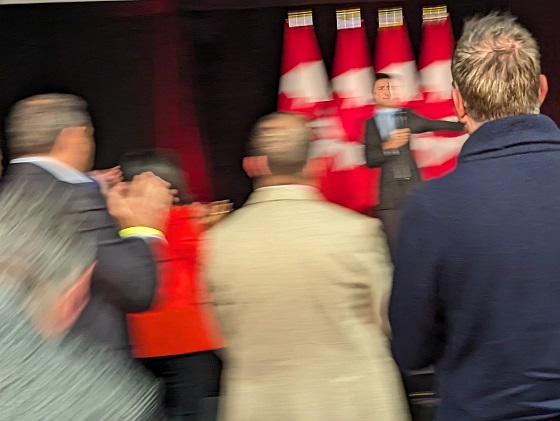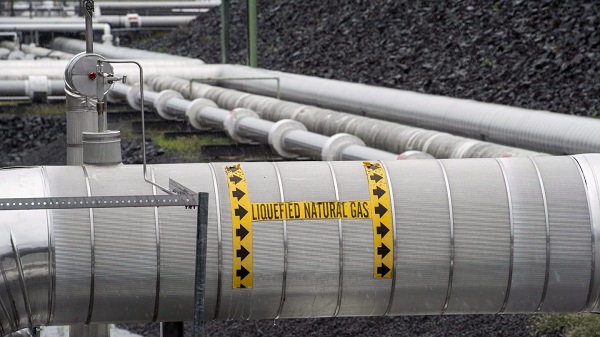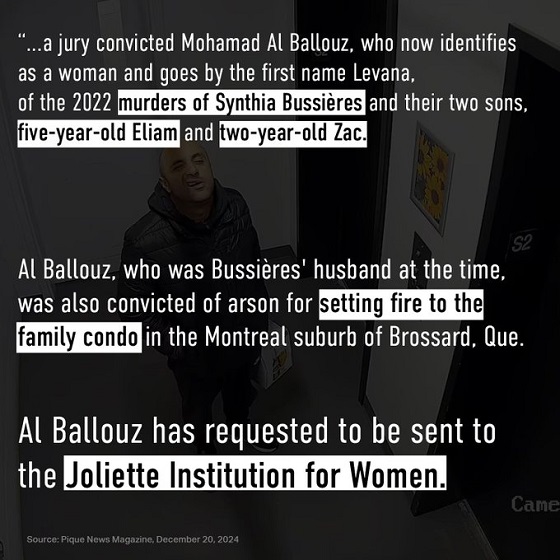National
By-election Bombshell! Justin Trudeau’s Liberals lose safe Toronto riding

Benefit of hindsight
Feel free to start coming back any time, big guy
Well, of course I saw it coming all along. What kind of fool could have imagined the Liberal in Toronto — St. Paul’s had any chance?
Hang on. I’m just getting word that I didn’t see it coming. In fact, as recently as Monday night I wrote a post I’ll be hearing about until the cows come home. Sorry about that!
Here are the actual final results, barring any recounts, which may not happen because Conservative Don Stewart’s margin of victory, while slim, is too large to trigger an automatic recount.
Congratulations, Don Stewart! I never doubted you’d win. Hang on. I’m just getting word that I doubted you’d win as recently as last night.
Things will now start to happen quickly. Expect Liberals to work their way through four of the five Kübler-Ross stages of grief before lunch. Denial will come easily, benefiting as it does from long practice. Acceptance may take longer.
The Paul Wells newsletter is fun reading even when I’m calling the results of a by-election wrong! Imagine how much you’ll enjoy it when I’m right about something!
In part this is because on paper there isn’t that much to accept. The day’s news is not earth-shaking and, in isolation, should not be taken as definitive. It’s true that by-elections are strange events, though if you add them together they do have some predictive power. It’s true that Leslie Church’s long service as Chrystia Freeland’s chief of staff turned out to be more of a hindrance than a help, a data point whose implications the Deputy Prime Minister won’t want to think much about today. It’s true the Liberals didn’t even try all that hard, if by “didn’t try all that hard” you mean “they tried as hard as they possibly could, my God they tried so hard, my God.”
But a single off-season defeat in a riding the Liberals have, in fact, previously lost during the Paleozoic era is not a larger thing to accept than, say, a punishing loss to Ireland and Norway in a Security Council vote at the UN. Or the loss of two senior cabinet ministers in a controversy in which the ministers who quit were radiantly, obviously in the right. Don’t take my word on that, incidentally: ask David Lametti, who agreed with Jody Wilson-Raybould but managed to keep his job anyway. For a while.
A single by-election defeat is not a larger thing to accept than the prime minister’s documented history of slapping on dark makeup for social occasions, a habit that stretched from junior college to young adulthood. It’s not a bigger deal than firing your finance minister during a global fiscal calamity so you can replace him with somebody who knows less about money. It’s not evidence of poorer strategic thinking than the choice of Parliament as the venue for dismantling a new Conservative leader, given that Parliament has long been where Justin Trudeau and most of his government perform worst.
It’s not a bigger deal than mocking monetary policy during an election campaign. It’s not a big new development, compared to the Prime Minister’s reluctance to meet his own cabinet ministers to discuss business, an oddity of his management style that’s been documented in a growing number of books (look out for Marc Garneau’s this fall!).
The prime minister has been on the ropes before, so to speak, and all those trials have made him the man he is today. Or rather, I suppose, his response to them has. I have no particular advice for Justin Trudeau today, or to the party he leads with the unstinting consent of its members. I screwed up last night by sending a column before the facts were in, so I’m feeling a little sheepish this morning. I’ll let Liberals decide what to do next.
As recently as two summers ago, I used to give them advice. It amounted to this: Notice when something you’re doing isn’t working. Change it. Make sure people see you changing it, so you don’t look quite so full of yourself. Rinse and repeat.
That post from 2022 ends:
“Don’t worry. He won’t take this advice either. Whatever the Liberal leader does on his return from the sunless south, it probably won’t resemble anything we’ve mentioned today. He’ll probably keep doing what he’s been doing. With the same results.”
Let me read to you
My excellent short bestselling book, Justin Trudeau on the Ropes: Governing in Troubled Times, is now an audiobook, narrated by the author, who is me. Here it is on Audible. Other platforms soon.
Here’s the story of the book, if you’re just catching up. Here’s an episode of my podcast with guest host Vassy Kapelos interviewing me about the book. Paper and ebook editions remain easy to find and buy, for yourself or friends.
We decided to make the audiobook some time after we published the, uh, more booky formats. It’s a response to surprising and gratifying demand. It’s also a promissory note: If this belated audiobook edition finds an audience, it won’t be my last.
There’s a school of thought that says there’s not much demand for nonfiction Canadian audiobooks. Here’s your chance to confound the skeptics. Thanks as always for your support.
Canadian Energy Centre
First Nations in Manitoba pushing for LNG exports from Hudson’s Bay

From the Canadian Energy Centre
By Will Gibson
NeeStaNan project would use port location selected by Canadian government more than 100 years ago
Building a port on Hudson’s Bay to ship natural resources harvested across Western Canada to the world has been a long-held dream of Canadian politicians, starting with Sir Wilfred Laurier.
Since 1931, a small deepwater port has operated at Churchill, Manitoba, primarily shipping grain but more recently expanding handling of critical minerals and fertilizers.
A group of 11 First Nations in Manitoba plans to build an additional industrial terminal nearby at Port Nelson to ship liquefied natural gas (LNG) to Europe and potash to Brazil.
Robyn Lore, a director with project backer NeeStaNan, which is Cree for “all of us,” said it makes more sense to ship Canadian LNG to Europe from an Arctic port than it does to send Canadian natural gas all the way to the U.S. Gulf Coast to be exported as LNG to the same place – which is happening today.
“There is absolutely a business case for sending our LNG directly to European markets rather than sending our natural gas down to the Gulf Coast and having them liquefy it and ship it over,” Lore said. “It’s in Canada’s interest to do this.”
Over 100 years ago, the Port Nelson location at the south end of Hudson’s Bay on the Nelson River was the first to be considered for a Canadian Arctic port.
In 1912, a Port Nelson project was selected to proceed rather than a port at Churchill, about 280 kilometres north.
The Port Nelson site was earmarked by federal government engineers as the most cost-effective location for a terminal to ship Canadian resources overseas.
Construction started but was marred by building challenges due to violent winter storms that beached supply ships and badly damaged the dredge used to deepen the waters around the port.
By 1918, the project was abandoned.
In the 1920s, Prime Minister William Lyon MacKenzie King chose Churchill as the new location for a port on Hudson’s Bay, where it was built and continues to operate today between late July and early November when it is not iced in.
Lore sees using modern technology at Port Nelson including dredging or extending a floating wharf to overcome the challenges that stopped the project from proceeding more than a century ago.
He said natural gas could travel to the terminal through a 1,000-kilometre spur line off TC Energy’s Canadian Mainline by using Manitoba Hydro’s existing right of way.
A second option proposes shipping natural gas through Pembina Pipeline’s Alliance system to Regina, where it could be liquefied and shipped by rail to Port Nelson.
The original rail bed to Port Nelson still exists, and about 150 kilometers of track would have to be laid to reach the proposed site, Lore said.
“Our vision is for a rail line that can handle 150-car trains with loads of 120 tonnes per car running at 80 kilometers per hour. That’s doable on the line from Amery to Port Nelson. It makes the economics work for shippers,” said Lore.
Port Nelson could be used around the year because saltwater ice is easier to break through using modern icebreakers than freshwater ice that impacts Churchill between November and May.
Lore, however, is quick to quell the notion NeeStaNan is competing against the existing port.
“We want our project to proceed on its merits and collaborate with other ports for greater efficiency,” he said.
“It makes sense for Manitoba, and it makes sense for Canada, even more than it did for Laurier more than 100 years ago.”
2025 Federal Election
Allegations of ethical misconduct by the Prime Minister and Government of Canada during the current federal election campaign

 Preston Manning
Preston Manning
A letter to the Ethics Commissioner sent April 9th, 2025
On April 4, 2025, during the current federal election period, in which employees of the Canadian Broadcasting Corporation (CBC) report on all aspects of the election, the unelected Prime Minister, without any consultation with or authorization by parliament but apparently with the concurrence of the Minister of Heritage, promised an increase of $150 million in the budget of the CBC on top of its $1.38 billion budget for the current fiscal year.
The CBC consistently and for obvious reasons tends to share the ideological orientation of the governing Liberal Party and its political allies, and supports many of their policy positions. It tends to ignore or oppose those of the Conservative Official Opposition which proposes dismantling the CBC.
The unelected Liberal Prime Minister promising a $150 million bonus to the CBC in the middle of an election campaign would thus strike any objective observer as unethical, damaging to public confidence in our democratic institutions, and deserving of investigation and commentary by your office.
In particular, it is respectfully requested that you address the following questions:
1. Has the Prime Minister acted unethically by promising the state owned broadcasting corporation, sympathetic to the governing party, a $150 million increase in its budget, during a federal election campaign?
2. Is the promise of a $150 million increase in the budget of the CBC, during an election period in which the CBC is expected to give objective coverage to the campaign, in effect a defacto bribe and contrary to the spirit and the letter of the Conflict of Interest Code and Act?
In addition, on April 7, 2025, again during the current election period, the Prime Minister has announced that the federal government will distribute approximately $4 billion in carbon rebate payments directly to approximately 13 million Canadians, many of whom are eligible voters, and will do so prior to the election day of April 28.
This naturally raises the following questions which it is again respectfully requested that you address:
3. Has the Prime Minister and the federal government acted unethically by authorizing the distribution, prior to election day, of almost $4 billion in rebate payments to approximately 13 million Canadians, many of whom are voters, and doing so with the suspected intent of winning the support of those voters?
4. Is the promise and delivery, prior to election day, of almost $4 billion in rebate payments to approximately 13 million Canadians, many of whom are voters, in effect a defacto attempt to bribe those voters with their own money, and contrary to the spirit and the letter of the Conflict of Interest Code and Act?
To assist in the consideration of these allegations, suppose the UN were to ask Canada to supervise a national election in a third world country where democracy is frail and elections subject to abuse by those in authority. Suppose further that the unelected president of that country, during the election campaign period, endeavored to secure:
· The support of the state broadcasting corporation by promising it a huge increase in its budget, and,
· The support of millions of voters by ensuring that they received a generous personal payment from his government just prior to election day.
In such a situation, would not the Canadian monitoring authority be obliged to strongly censure such behaviors and report to the UN that such behavior calls into question the democratic legitimacy of the election subjected to such abuses?
If we as Canadians would consider such political behaviors anti-democratic and unacceptable if practiced in a foreign country, ought we not to come to the same conclusion even more quickly and certainly when they are regrettably practiced in our own?
Please respond to questions 1-4 above prior to April 25, 2025 and please ensure that your responses are made public prior to that date.
Thanking you for your service and your commitment to safeguarding public confidence in Canada’s democratic institutions and processes.
Your sincerely,
Preston Manning PC CC AOE
-

 espionage21 hours ago
espionage21 hours agoEx-NYPD Cop Jailed in Beijing’s Transnational Repatriation Plot, Canada Remains Soft Target
-

 Business1 day ago
Business1 day agoDOGE Is Ending The ‘Eternal Life’ Of Government
-

 2025 Federal Election2 days ago
2025 Federal Election2 days agoRCMP Whistleblowers Accuse Members of Mark Carney’s Inner Circle of Security Breaches and Surveillance
-

 2025 Federal Election2 days ago
2025 Federal Election2 days agoNeil Young + Carney / Freedom Bros
-

 2025 Federal Election1 day ago
2025 Federal Election1 day agoTucker Carlson Interviews Maxime Bernier: Trump’s Tariffs, Mass Immigration, and the Oncoming Canadian Revolution
-

 2025 Federal Election1 day ago
2025 Federal Election1 day agoCanada drops retaliatory tariffs on automakers, pauses other tariffs
-

 2025 Federal Election2 days ago
2025 Federal Election2 days agoBureau Exclusive: Chinese Election Interference Network Tied to Senate Breach Investigation
-

 Autism2 days ago
Autism2 days agoRFK Jr. Exposes a Chilling New Autism Reality












